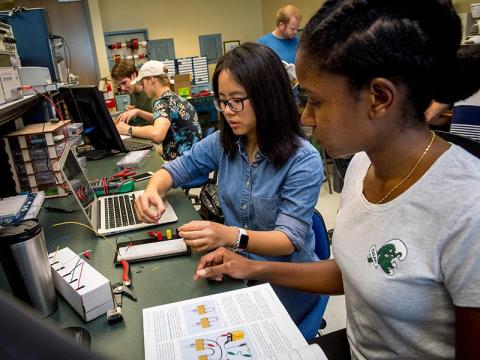Tulane School of Science and Engineering announces new engineering minors for fall 2024
In the fall 2024 semester, undergraduates at Tulane University will have three new options for minors in the School of Science and Engineering (SSE): mechanical engineering, electrical engineering and materials engineering.
These new minors accompany the recent addition of a civil engineering minor in the Department of River-Coastal Science and Engineering, a sign of growing engineering instruction and research at Tulane.
Matthew Escarra, an associate professor in SSE, and his colleagues have been developing these minors for a few years.
“[SSE] Dean [Kimberly] Foster came to us around 2020 and asked if we could put together a plan to grow electrical and mechanical engineering,” said Escarra. They created a committee of faculty members across SSE’s engineering departments and started building programs.
Although electrical, mechanical and materials engineering have been available as certificates for engineering physics students for some time, they have not been available to the broader Tulane community. These minors will allow students in other majors, including those outside SSE, to study electrical, mechanical and materials engineering.
Tulane has PhD and master’s programs in materials engineering, but this will be the first materials engineering program widely available to undergraduate students. The expansion of materials engineering is a logical step for the school, with a wide range of faculty studying materials science. “We have over 20 faculty doing materials research of some kind,” said Escarra.
Engineering has been a part of Tulane since the 1890s, when mechanical and electrical engineering were first introduced to the curriculum with the foundation of the College of Technology, which became the School of Engineering. The School of Engineering was then incorporated into the School of Science and Engineering in 2006.
“Tulane has a long and rich legacy in these disciplines, so this isn’t something that’s brand new,” said Escarra of the programs, “but it is reimagined.”
These reimagined programs will not only benefit current and prospective students, they will be a boon for the local community as well. “In New Orleans, we need strong engineering,” said Escarra. “Whether it’s our water and power utilities, coastal restoration, energy, aerospace, or many other things, it’s very important to our region.”
Each minor is 18 credits with 20 credits of prerequisites, meaning they are accessible for non-STEM majors as well as students already studying a STEM-related discipline. SSE expects most of the current engineering physics majors to start one of the minors in the fall, as well as some students studying biomedical and chemical engineering. The new programs are also expected to attract students ranging from business to architecture who are interested in better preparing for their future careers in our technological world.
“Faculty in all of our engineering departments have worked hard to expand our engineering offerings at Tulane,” said Foster. “I am thrilled that the minors in mechanical engineering, electrical engineering and materials engineering will be available to Tulane undergraduates both inside and outside of the School of Science and Engineering beginning this fall. Given our research growth in these disciplines, it makes sense that we provide new opportunities to attract students with design and engineering interests to Tulane.”
The next steps, Escarra says, will likely be the development of master’s programs for electrical and mechanical engineering, but a specific timeline has not yet been established.
Registration is now open for fall 2024 classes. To learn more about these and other engineering programs at Tulane, visit the School of Science and Engineering undergraduate programs website.

